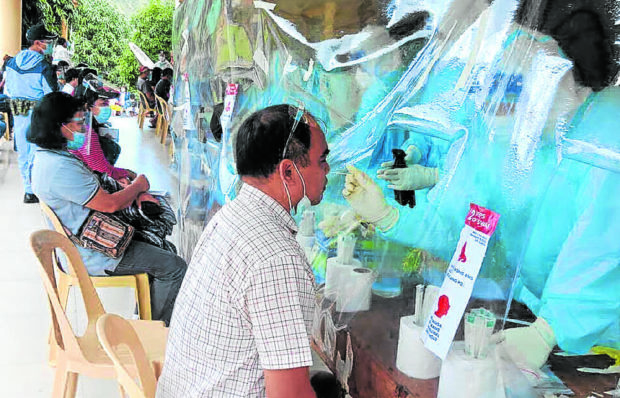
MASS TESTING Residents of Bontoc, Mountain Province, undergo the government’s free mass swab testing on Jan. 28 at the provincial plaza following the surge of COVID-19 infections that included the more contagious UK variant. —PHOTO FROMBONDOC FACEBOOK PAGE
BAGUIO CITY—Sixteen new cases of the UK variant of the new coronavirus disease (COVID-19) were recorded in the Cordillera, an official of the Department of Health (DOH) said on Monday.
Dr. Amelita Pangilinan, DOH assistant director in the Cordillera, said eight of the fresh cases of the more contagious variant (B.1.1.7.) were listed in Mountain Province where the first 17 UK variant cases in the country were located in January.
At a press briefing, Pangilinan said two of the latest UK variant cases—an 18-year-old patient in Mountain Province and a 39-year-old woman in Benguet province—have died.
The country’s first UK variant fatality was an elderly resident of Benguet who died in a Baguio hospital in January. A fourth fatality due to the UK variant was also recorded but details surrounding the death have not been disclosed.
According to Pangilinan, Benguet has five new UK variant cases—three in the capital town of La Trinidad and two in the mining town of Mankayan. La Trinidad had previously recorded other UK variant infections.
Baguio, which recorded its first UK variant case on March 1, has a second UK variant patient, Pangilinan said.
2 kids infected
Two children, age 5 and 7, were also among the new UK variant cases in the region.
The young patients are the first UK variant cases in Lubuagan town in Kalinga province. Both children were siblings of COVID-19 patients, with the children turning out to be UK variant carriers after their genome sequencing results were released in February.
Analysts were looking to study if the UK variant was contributing to the recent surge of transmissions in the region, Pangilinan said.
The Cordillera is classified as a high epidemic-risk zone based on its average daily attack rate, topped by rising transmissions in Apayao, Mountain Province and Baguio City.
As of Sunday, the region had 1,381 active COVID-19 cases, raising the Cordillera total to 16,590 patients since the public health crisis was declared a year ago.
Pangilinan said the new surges could be the result of quarantine fatigue, the breach of protocols in public places, and the recent loosening of travel restrictions resulting to increased mobility.
“But nine out of 10 COVID-19 patients recover quickly and are reintegrated in the community,” Pangilinan said.One Cordillera town mayor also informed the DOH that he has “lost trust” in the health emergency system, she said.
Pangilinan was referring to Sadanga Mayor Gabino Ganggangan of Mountain Province, who was suspected to have contracted COVID-19 after he lifted all protocols except the use of masks and shields and observing physical distancing.
Pangilinan said she visited Ganggangan recently with a coordinated operations to defeat epidemics (CODE) team to determine how he has employed mandatory health rules to contain the virus.
The mayor refused to submit his swab samples for testing so the DOH could not conclusively state if he has contracted the disease, “but his symptoms point to COVID-19,” she said.
Pangilinan said Ganggangan had lost faith in the hospital system and preferred to be taken care of by his family.
He also provided the CODE team with details about the indigenous health systems and dietary supplements he prefers to use in combating the virus, Pangilinan said.